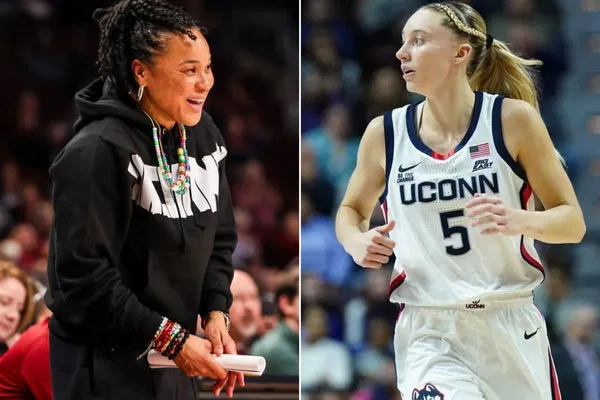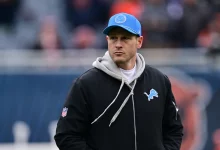South Carolina’s Dawn Staley revealed Alabama once tried to hire her, but she declined, choosing a different coaching path.

In the landscape of women’s college basketball, few names resonate with as much authority and admiration as Dawn Staley. Known not only for her excellence as a player but also for her transformative work as a head coach, Staley’s decisions over the years have defined not only her own career but the trajectory of the programs she has led. One such pivotal moment came when she turned down a coaching opportunity from the University of Alabama, a revelation that has intrigued many within the sports world. Her decision, based on vision and instinct, ultimately led her to South Carolina, where she has built one of the most dominant programs in the sport’s history.
The Revelation: Alabama’s Attempt to Hire Dawn Staley
In a candid revelation, Staley shared that the University of Alabama pursued her for their women’s basketball head coaching position. This interest came during a phase when Staley was rapidly rising in coaching circles, making waves at Temple University. At the time, she had already proven her ability to lead, motivate, and build a competitive program.
The offer from Alabama was no small gesture. As a prominent SEC school with strong athletic infrastructure and a legacy in sports excellence, the university believed Staley could be the leader to elevate their women’s basketball program. Her pedigree as a WNBA star, Olympic gold medalist, and proven collegiate coach made her a prime candidate.
However, in what would turn out to be a defining decision, Staley declined the offer.
Why She Said No
When Staley declined Alabama’s offer, it wasn’t out of disregard for the program or the prestige of the university. Instead, it was about fit—both in terms of vision and personal alignment. Coaching, for Staley, has never been about simply occupying a high-profile position; it’s about connection, purpose, and the opportunity to build something meaningful.
In various interviews, Staley has emphasized that her coaching philosophy revolves around trust, culture, and the holistic development of student-athletes. When evaluating opportunities, she considers whether a program aligns with these values. It’s likely that at the time, Alabama didn’t quite feel like the place where she could bring her full vision to life.
Additionally, timing played a crucial role. Staley was deeply invested in her work at Temple, her alma mater, where she was laying the groundwork for long-term success. Her commitment to finishing what she started there—and doing so with integrity—speaks to her loyalty and discipline as a leader.
The South Carolina Opportunity
While Alabama’s pursuit didn’t yield results, another SEC program would eventually become the right fit. In 2008, the University of South Carolina approached Staley with a vision to elevate their women’s basketball program from mediocrity to prominence.
At the time, the Gamecocks were not seen as a powerhouse. The program had only seen limited success on the national stage and lacked the consistency and culture needed to contend for championships. But what South Carolina offered was something Staley found irresistible: a clean slate, institutional support, and the chance to create a legacy from the ground up.
She accepted the offer—and the rest is history.
Building a Powerhouse in Columbia
Staley’s impact on South Carolina basketball was immediate and profound. She brought with her not only a winning mindset but also a culture of accountability, discipline, and belief. Her approach to coaching—one that balances tough love with unwavering support—resonated with her players and began to attract national attention.
By her sixth season, Staley led the Gamecocks to an SEC championship. She recruited top-tier talent, including multiple No. 1 overall recruits, and built a program that emphasized defense, teamwork, and grit. Under her leadership, South Carolina transformed from an underdog into a perennial national title contender.
Her crowning achievement came in 2017, when she led South Carolina to its first-ever NCAA Women’s Basketball Championship. The win was not just a personal triumph but a testament to the vision that Staley had carried with her—one she believed South Carolina could fulfill when she turned down Alabama years before.
Leadership Beyond Basketball
One of the most remarkable aspects of Dawn Staley’s journey is her influence beyond wins and losses. She is a vocal advocate for gender equity, racial justice, and the empowerment of women in sports. During the height of national conversations around social justice, Staley used her platform to speak out, ensuring that her players had a voice and felt supported both on and off the court.
She also serves as a mentor to young coaches and players, regularly participating in panels, mentoring initiatives, and community outreach. Her leadership has extended to the national team level, where she has served as head coach for USA Basketball, guiding the team to Olympic gold.
Staley’s refusal to accept the Alabama job—despite the prestige it offered—was, in many ways, the first of many choices she would make that reflect her commitment to values over titles, to long-term impact over immediate gain.
Legacy and “What If?”
It’s always tempting to ask “what if?”—what if Staley had accepted the Alabama job? Would she have found the same success? Would Alabama have become the powerhouse that South Carolina is today?
While it’s impossible to say for certain, one thing is clear: Staley’s success at South Carolina was a product not just of her coaching skill, but of an environment that allowed her to implement her full vision. The relationship between coach and institution was—and continues to be—mutually beneficial. South Carolina gave Staley the keys and full trust, and she returned the favor by elevating the program to national prominence.
Alabama, while a storied athletic school, may not have been ready for the kind of transformation Staley envisioned at the time. Her decision to wait, to be selective, and to trust her instincts has proven wise. Sometimes the road not taken makes all the difference.
Mentoring Future Generations
Another key aspect of Staley’s legacy is her commitment to mentoring the next generation. Former players have gone on to successful professional careers in the WNBA and overseas, and many attribute their personal growth and resilience to their time under her guidance.
Her coaching tree is also beginning to take shape, with assistants and former players stepping into leadership roles at other programs. Staley’s influence is rippling out across the sport, and her decision-making—like turning down Alabama—provides a model for young coaches about the importance of finding the right fit, not just the biggest opportunity.
The Hall of Fame Career Still in Progress
Dawn Staley is already a member of the Naismith Memorial Basketball Hall of Fame as a player, and her induction as a coach seems inevitable in the years to come. Her résumé includes multiple national championships, Olympic medals, and countless individual accolades.
But more than that, her journey is one of intentional choices. Saying “no” to Alabama allowed her to say “yes” to South Carolina. That choice changed not just her career, but the face of women’s college basketball.
A Decision That Defined a Dynasty
In hindsight, Dawn Staley’s decision to decline Alabama’s offer may have seemed surprising, but it was rooted in foresight, clarity, and values. She waited for the right opportunity—one that matched her ambition, her vision, and her philosophy.
That opportunity came in the form of the South Carolina Gamecocks, a program that, under her leadership, has become synonymous with excellence, resilience, and empowerment. Her story is a lesson for athletes, coaches, and leaders alike: sometimes the hardest “no” leads to the most rewarding “yes.”









